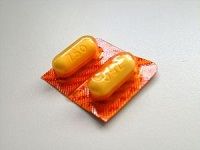Ivabradine Shows No Benefit for Stable Coronary Artery Disease
Results of a large international study known as SIGNIFY showed ivabradine offered no benefit to patients who had stable coronary artery disease without clinical heart failure (CHF).

Results of a large international study known as SIGNIFY showed ivabradine offered no benefit to patients who had stable coronary artery disease without clinical heart failure (CHF).
In fact, patients with class II or higher angina in the study were at higher risk of dying and of having a heart attack than patients receiving a placebo. Serious adverse events happened in 37.6% of these patients versus 35.4% in the group that received a placebo.
The drug is being evaluated on a priority review basis by the US Food and Drug Administration (FDA) for a different use--treating CHF, the FDA announced last week.
Meanwhile, the SIGNIFY study, released Aug. 31 at the European Society of Cardiology Congress and published in the New England Journal of Medicine, showed it was not a good choice for the stable coronary artery disease patients. The researchers said they found the drug, sold abroad as Procoralan and Corlentor, did not decrease those patients’ risk of having a future major cardiac event.
That finding has sparked an investigation by the European Medicines Agency, which approved the drug for both uses.
Ivabradine, a drug developed by Servier in Suresnes, France, which Amgen will market in the US if it gets FDA approval, works by reducing the heart rate without affecting blood pressure of left ventricular systolic function. It is available in 102 countries.
In the SIGNIFY study researchers followed a group of about 19,000 patients--half getting ivabradine and the rest a placebo—from Oct. 2009 through Jan. 2014. More than 70% were men and the mean resting heart rate for the study group was 77.2 beats per minute.
Most subjects (77.3%) had had a previous heart attack and all were taking standard drugs to prevent a major cardiac event. Those drugs included aspirin, statins, ACE inhibitors, and beta-blockers.
In the study, when ivabradine was added to patients’ regimes, though by 3 months the mean heart rate dropped to 60.7 beats per minute, “we found no benefit of ivabradine in reducing the risk of cardiovascular events,” lead author Kim Fox, MD wrote in the journal article.
The research team members are uncertain why that is so. It may be that ivabradine decreased the heart rate too much, or that it may have interacted unfavorably with the other heart drugs patients took, or “it is also possible that heart-rate-reducing antianginal agents have no effect on outcomes in patients with stable coronary artery disease,” Fox wrote.